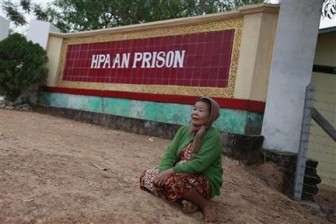YANGON, (Reuters) – Myanmar freed at least 200 political prisoners yesterday in an amnesty that prompted the United States to upgrade diplomatic relations as one of the world’s most reclusive states opens up after half a century of authoritarian rule.

The move by Myanmar could embolden the opposition and put pressure on the West to lift sanctions. Among those freed are long-persecuted democrats and ethnic leaders whose proven ability to organise and inspire could increase pressure on President Thein Sein to accelerate nascent reforms.
In Washington, Secretary of State Hillary Clinton said the United States was ready to begin the process of exchanging full ambassadors after an absence of two decades, and would consider additional measures if the new civilian-led government’s reforms continue.
The United States and Europe have said freeing political prisoners is crucial to even considering lifting the economic sanctions that have isolated the former British colony, also known as Burma, and pushed it closer to China during five decades of often-brutal military rule that ended last March.
U.S. President Barack Obama called the release a “substantial step forward” in the Asian country’s democratic reforms. “Much more remains to be done to meet the aspirations of the Burmese people, but the United States is committed to continuing our engagement,” Obama said in a statement.
As big as France and Britain combined, Myanmar lies between India, China and Southeast Asia with ports on the Indian Ocean and Andaman Sea, all of which make it an energy security asset for Beijing’s landlocked western provinces and a U.S. priority as Obama strengthens engagement with Asia.
Its resources include natural gas, timber and precious gems. Myanmar is building a multibillion-dollar port through which oil can reach a 790-km (490-mile) pipeline under construction with Chinese money and workers.
It was unclear exactly how many political detainees were among the 651 inmates covered by the amnesty, the second ordered by authorities in four months. About 230 political detainees were released in an earlier general amnesty on Oct. 12. The Assistance Association for Political Prisoners (Burma), a group that tracks prisoners, said at least 200 had been freed yesterday. These included Min Ko Naing and other members of the “88 Generation Students Group”, who led a pro-democracy uprising in 1988 when thousands of protesters were killed. Also freed was Shin Gambira, a Buddhist monk who led 2007 street protests crushed by the army. He was 27 years old when sentenced to 68 years in prison in 2007. Khin Nyunt, the once-powerful chief of military intelligence (MI), was also released from house arrest. Appointed prime minister in 2003, he ushered in a then-derided seven-point “roadmap to democracy” but was purged a year later in circumstances that were never explained. He had been under house arrest ever since.
Speaking to reporters outside his home in Yangon, Khin Nyunt expressed hope for the country, citing recent meetings between the president and opposition leader Aung San Suu Kyi, and visits by dignitaries such as Clinton, who last month became the first U.S. secretary of state to visit Myanmar in 50 years.

